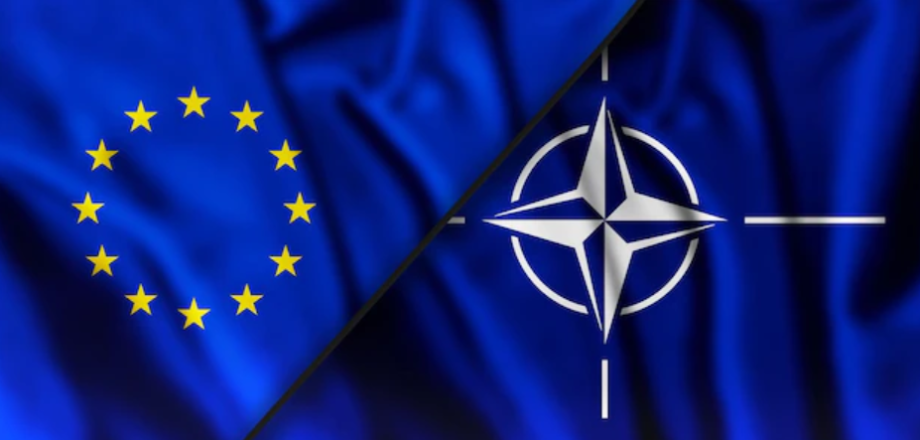Strategic Responsibility: How a stronger EU in a reinforced alliance can make security on our continent more sustainable

Russia’s aggression against Ukraine has proven NATO’s existential value and has set the parameters regarding what must be done to make the Alliance more responsive and sustainable. Europeans had previously learned to be sceptical about the EU’s ability to be a security provider and wondered whether there was even a need. The EU and its member states have now, however, upped their game by deploying an arsenal of new tools. At the same time, NATO is stronger than ever, and the links between Europe and America have been reinforced.
The revitalisation of the transatlantic Alliance provides the opportunity to put longer-term changes in place. These should be aimed at (1) rebalancing the Alliance by fostering a stronger European military and defence capacity, (2) better embedding EU and NATO Eastern flank countries into core discussions regarding security challenges and planning a secure future for the continent, and (3) ensuring sustainable American buy-in for the Alliance by levelling out spending on security and pursuing more robust alignment on China.
1. Better burden-sharing in the Alliance
In a break from past deficiencies, the EU and its member states have risen to the occasion. The glass, however, remains half empty.
Though the EU has adopted unprecedented sanctions against Moscow, the bloc now must return to patching loopholes and setting up mechanisms to enforce and monitor these measures. The Union has also extended essential financial assistance to Ukraine, provided Ukraine with a clear pathway towards gaining EU membership, and absorbed millions of displaced Ukrainians despite bureaucratic obstacles. Nonetheless, the EU still needs to pass a critical test on resilience in sustaining public support over a potentially protracted period.
Meanwhile, the financing of weapons transfers to Ukraine represents an unprecedented move for the EU. The freshly set EU Military Assistance Mission will further pull and coordinate the capacities of European armies to train Ukrainian armed forces.
Yet these efforts, though crucial, are still only complementary to core military assistance that has come from other allies. Indeed, Ukraine might have already lost the war had it not been for military deliveries from the US and UK, two non-EU countries. Consequently, NATO and the transatlantic relationship have seen their triumphant return.
European allies are many decades away from any dream of self-sufficiency. The EU is responsible to its citizens to provide more substantial contributions, including the enhancement of military capacities to support regional security. The Union should also focus on more actively seeking and facilitating security and defence cooperation with non-EU allies, such as the UK.
2. Embedding the eastern flank into the core of security strategies and their implementation
The EU’s centre of gravity is likely to shift eastward, as the eastern part of the continent will increasingly shape the European project – with consequences for the Union’s international posture.
It is not only because of the war in Ukraine per se but also because Western Europe’s leading powers, such as Germany and France, were proven astonishingly wrong about Putin’s Russia. Ukraine’s status as a candidate country further implies, albeit from a more long-term perspective, that EU enlargement will extend not only to the southeast but also substantially to the east.
Therefore, the EU will need to develop a more robust position vis-à-vis Russia, a greater commitment to the Eastern neighbourhood, a renewed emphasis on hard security, and a stronger belief in the future of the transatlantic Alliance. Most countries on the eastern flank of the EU, as well as the north, have no grounds to believe that Western Europe’s capacities, and/or political will, are sufficient to guarantee the continent’s defence independent of the United States. This is why ‘strategic autonomy’ and/or ‘European sovereignty, while justified in matters of supply chains in energy, technology etc., are terms that will fall on sceptical ears in Central Europe if applied to security as such.
Nevertheless, if eastern flank countries are to sustainably gain a larger say in the EU’s security stance, they will need to end ambiguity over the rule of law, strengthen their voice, and play a more constructive role. There are recent positive signs of this, for example in Czechia, and possible indications that change may come very soon in Poland, where opinion polls suggest a change of government in 2023. However, the cases of Hungary and Bulgaria, among others, give cause for pause. Civil society, political parties, and think tanks will need to step up when governments fail to make the constructive voice of Central Europe heard in the debate over Europe’s future.
Barring regime change in Moscow, Ukraine will continue to defend itself. Russia must be contained in the Eastern neighbourhood, and its influence countered globally. The old Western European credo that ‘security in Europe cannot be organised without, let alone against Russia’ must be replaced by the simple truth that, for the foreseeable future, security in Europe will be security from Russia. A Russia that the rest of Europe can live and cooperate with will be a radically different country than what it is today. Confronting the Kremlin today, instead of granting Putin even partial success, is the only way for us to facilitate systemic change in Moscow and thereby the emergence of this kind of new Russia, whenever that may happen.
3. Ensuring sustainable buy-in from the US
It is also apparent that a US commitment to European security, no matter the cost, should not be taken for granted. The US, for example, could weaken its commitment to European security following the recent midterm elections and possibly commit a U-turn altogether in 2024, depending on the next occupant of the White House.
While acknowledging and preparing contingencies for these very legitimate concerns, Europe must also build on positive pre-conditions that bolster the transatlantic commitment and work on influencing the factors it can.
First of all, there is still a strong transatlantic majority in Congress and the Washington institutions that will not go away no matter the result of the 2024 elections. All European governments, as well as civil societies, need to intensify their engagement with those in the US who are already on their side and make a more persistent and persuasive case for those with doubts. Secondly, Europeans can exert considerable influence over American sentiment regarding their continued transatlantic commitment. The extent to which Europeans devote more effort and resources to their own security will be one factor. Yet equally important will be the willingness of Europe to align with Washington on China, undoubtedly the top foreign policy priority of the US over the long term. Europeans should indeed prioritise the issue too and more actively seek common ground with the US and other like-minded democracies when it comes to China. That does not mean sacrificing the EU’s interests: a more robust posture vis-à-vis China’s increasingly assertive global engagement is very much what the EU needs, both for its own sake and because it would help keep the US involved in European security. On the other hand, trying to play the role of a ‘third pole of power’ between Washington and Beijing will only accelerate the US pivoting to Asia as a priority.
To this end, strategic autonomy is not what Europe needs. But strategic responsibility is essential vis-à-vis EU citizens, Eastern neighbours, allies in North America, and most of all, Ukrainians. These are the lessons to heed today from Russia’s invasion of Ukraine in taking a significant step forward in our common efforts to build, secure, and defend the Europe of tomorrow.


Vice President for Policy and Programming
Senior Associate Fellow